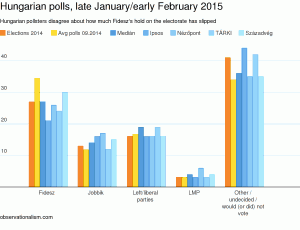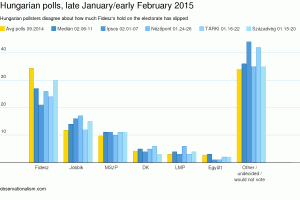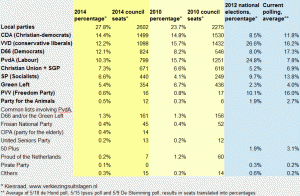The Hungarian pollsters have been disagreeing about how much the grip which Viktor Orban’s governing party Fidesz has on the Hungarian electorate has been slipping. Things surely aren’t looking as favourable for them as, say, half a year ago, for a number of reasons. One has to keep in mind, however, that Fidesz enjoyed quite a boost after its national election victory last April, when it went on to win big in European and municipal elections later in the year as well. So to some extent we’re merely seeing a return to the already impressive level of support it enjoyed in those April elections.

Chart: Hungarian polls; grouping together the left-liberal parties that ran a joint "Unity" list in last year's national elections (click to enlarge)
Fidesz’s current two-thirds parliamentary majority is in question with by-elections taking place in Veszprém two days from now. The district includes both Veszprém itself, a relatively prosperous town in Western Hungary, and some surrounding countryside, and outgoing MP Tibor Navracsics (now European Commissioner) won the seat easily last year, so it’s not the easiest place for the opposition to launch a challenge. If it does win the seat, however, Fidesz could theoretically be prevented from adopting further, hard-to-overturn “cardinal laws,” which require a two-thirds majority – though that presumes that the MPs from the center-left parties and the far-right Jobbik are able of voting in unison against the government. Even if Fidesz will hold on in Veszprém (and it’s still favoured to do so), it will face the same challenge all over again in parliamentary by-elections in a district centred on nearby Tapolca in April.
In its infinite wisdom, the left-liberal opposition parties are supporting a “free-market evangelist” as their joint candidate, Zoltán Kész. The hard-right Hír TV station has dug up not all that old blog posts and social media comments in which Kész advocated privatizing health care and primary education and even making voting rights conditional on tax payments. That’s the Hungarian “left” — the same left which hurried to distance itself from Alexis Tsipras in the aftermath of Syriza’s election victory in Greece — proving once again that it is anything but. It did, after all, also eventually embrace Lajos Bokros, known best for the 1990s “Bokros package” of massive budget cuts, in the Budapest mayoral elections. The Green LMP is the only party on the left which is refusing to support Kész, whom András Schiffer called the candidate of the “pseudo-Left”.
Having said that, the government does seem somewhat worried, jumping in late last year to quickly direct a special, 2.5 million Euro grant toward Veszprém. Although Fidesz easily dispatched all opposition forces in last October’s local elections, at least outside Budapest, it hasn’t been lucky in local by-elections since. Eva S. Balogh summarizes the story on those, with left-liberal opposition voters apparently even showing some readiness to swing behind candidates of the far-right Jobbik if that’s what it took to oust a Fidesz councillor. The seemingly only opinion poll to be held in the Veszprém district saw a close race, with Fidesz candidate Lajos Némedi only narrowly leading Kész by 43% to 37%, and even that only thanks to the rural parts of the district, while Kész led in the city itself.
Despite his libertarian views, I hope Kész wins, and Veszprém might be a liberal enough town for him to stand a chance. This is no way for the opposition to rebuild a national election-winning force though. Hungarians have arguably voted out the parties most associated with budget cuts, privatizations and market-friendly reforms almost every single time since 1994, ever again believing the then-opposition’s (deceptive) promises that they would govern more socially. They brought back the socialists from the dead in 1994, then voted in Fidesz in 1998 when those socialists turned out to be more neoliberal than even the previous conservative government. They kicked Fidesz out again in 2002 in favour of the newly-populist Socialists, and reelected those in 2006 after they’d gone on a rather irresponsible spending spree. In 2010, after four years of Gyurcsany and Bajnai pursuing austerity, they dealt the Socialists a massive defeat in favour of Fidesz, and last year they reaffirmed their support for Fidesz and its national-populist rhetoric of resistance against the EU’s and IMF’s economic prescriptions. And yet the left-liberal parties that aim to bring Fidesz down now seem to be going out of their way to look like the local representative of Brussels, business and banks. In the process, they are leaving the far-right Jobbik to sweep up the votes of the increasing numbers of disgruntled middle- and lower-income voters who are disappointed with the arrogance and corruption of Orban-ocracy but poor enough to have faced the wrong end of the free market.
The center-left opposition should perhaps instead take heed of a recent poll which revealed that Jobbik is now the largest party among those younger than 30. That’s scary. To fight that trend, it’s time for the left, such as it is, to show that its primary concern is with the struggle many poor, working class and lower-middle class Hungarians are waging to get by. I’m not sure that identifying itself with the likes of Kész and Bokros is going to help with that.
Update: Opposition candidate Zoltán Kész won, and with a surprisingly comfortable margin, 42,6% against the Fidesz candidate’s 33.8%, the Jobbik candidate’s 14.1%, and the LMP’s 4.6% (the remainder went mostly to independent candidates). That’s a striking contrast with last year’s results, when Navracsics got 47.2%, the center-left’s joint candidate 27.6%, the Jobbik candidate 16.5% and the LMP candidate 6.2%. Turnout was 45%, which is lower than last year’s 64% but high for a by-election. Christopher Adam at Hungarian Free Press has more info. Worth noting: somebody on Twitter mentioned that the 8 o’clock news broadcast on national public TV mentioned nothing about the election result, even though some 80% of the votes had by then already been counted, and it was clear that Fidesz was losing.

